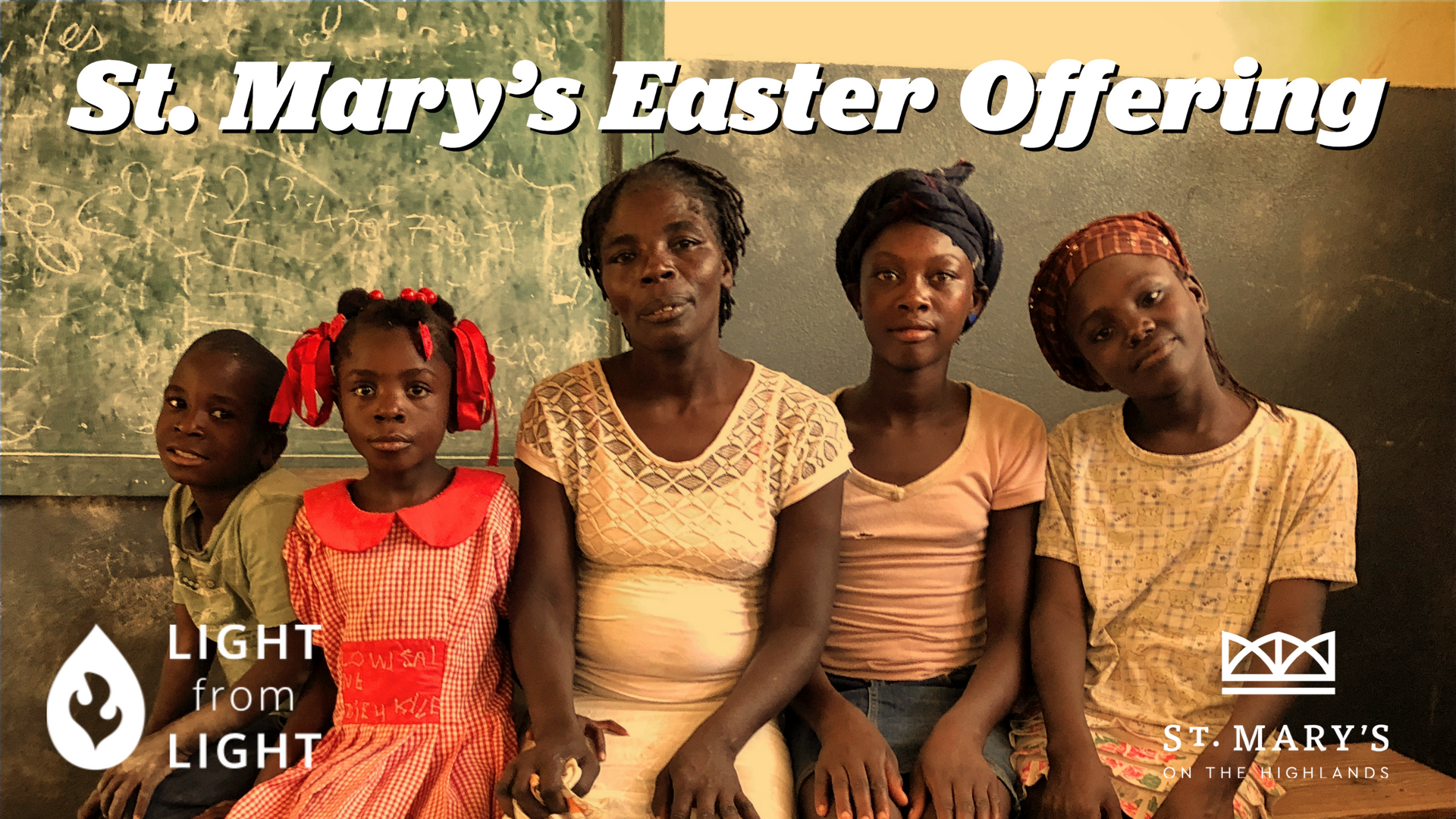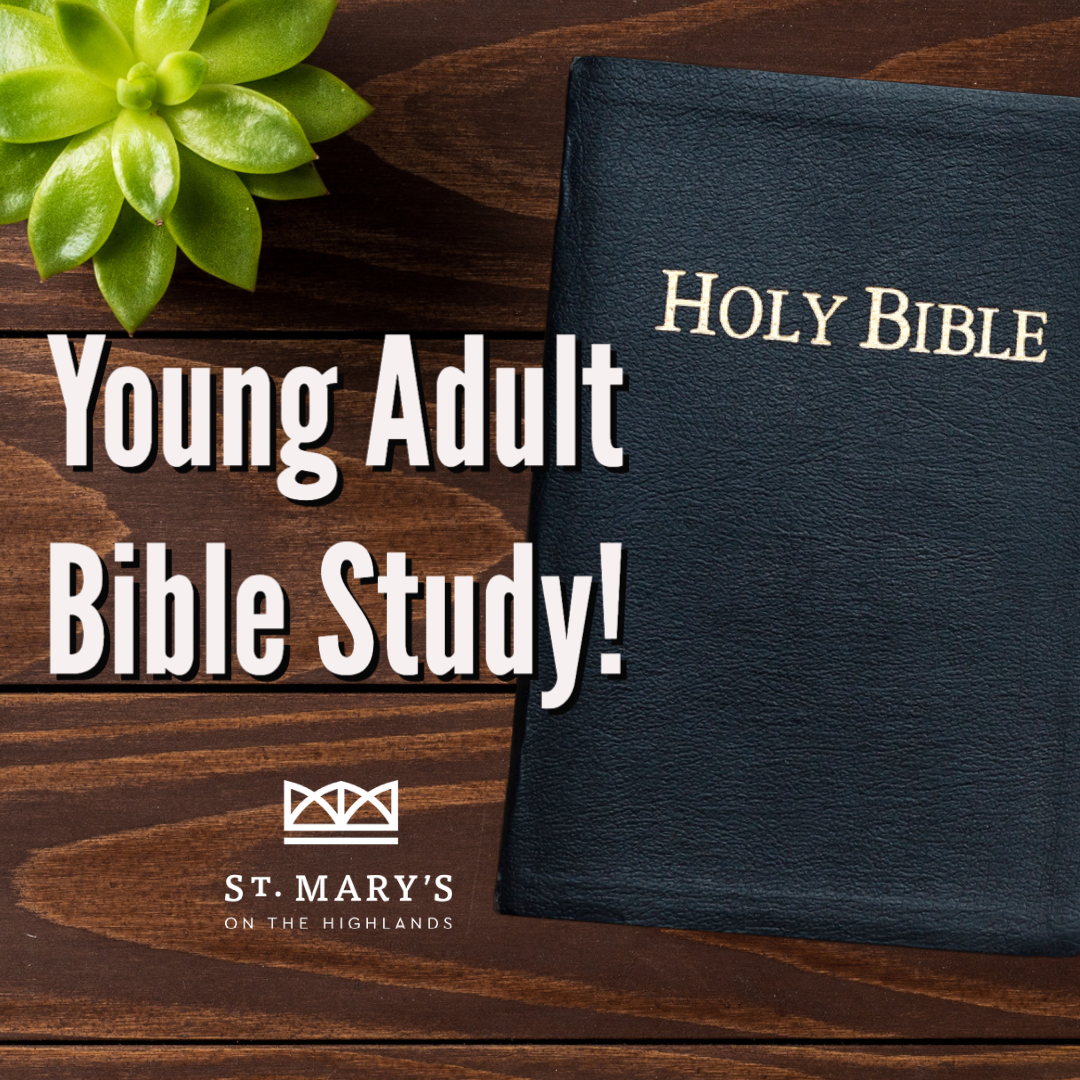HOLY WEEK AND EASTER AT ST. MARY’S
THE SUNDAY OF THE PASSION-PALM SUNDAY: April 2
8:00 AM Liturgy of the Palms and Holy Eucharist
10:30 AM Liturgy of the Palms and Holy Eucharist
Nursery provided.
5:00 PM
Liturgy of the Palms and Holy Eucharist
Nursery provided.
6:00 PM Palm Sunday “Run into Holy Week”
Monday-Friday, April 3-7
9:00 AM-3:00 PM Labyrinth open in Randolph Memorial Hall
Monday-Wednesday, April 3 – 5
12:05 PM Noonday Holy Eucharist in the chapel
THE TRIDUUM
Maundy Thursday: April 6
5:30 PM
Foot Washing and Holy Eucharist
Nursery provided.
Good Friday: April 7
10:30 AM – Noon Lenten Prayer Hour (followed by light lunch)
12:05 PM Good Friday Liturgy and Communion from the reserved Sacrament
Immediately following: Stations of the Cross
Nursery opens at 11:45 AM.
The Great Vigil of Easter: April 8
6:30 PM Holy Baptism and Holy Eucharist
Nursery provided.
EASTER SUNDAY: April 9
7:00 AM Holy Eucharist
8:30 AM The Music of Easter
9:00 AM Holy Eucharist- Family Service with string ensemble, Children’s Choir, and Parish Choir
Overflow seating available in the chapel.
10:30 AM The Music of Easter
11:00 AM Holy Eucharist with string ensemble and Parish Choir
Overflow seating available in the chapel.
Nursery opens at 8:15 AM.
Livestream begins at 8:30 AM
The Parish Office will be CLOSED on Monday, April 10.
Daily Morning Prayer resumes Tuesday, April 11.
Rector Bible Studies
Our topic this fall is
Life among the Corinthians. We will study and discuss the letters Paul wrote to early Christians living in Corinth. The church there was particularly important to him, and many of his issues and concerns are present in today’s church as well. Both studies begin and end with prayer; both last about 50 minutes.
- Men’s Early Morning Bible Study: Tuesdays at 7:10 AM in Randolph Memorial Hall
- Women’s Mid-Morning Bible Study: Wednesdays at 10:10 AM in Randolph Memorial Hall
Both studies take place in RMH where there is room to spread out, and both will be made available via Zoom. Enter Drennen House via the breezeway or motor court.
All are welcome! Bring a friend and join in the conversation. There is much to learn about ourselves and the early Christians at Corinth!
Young Adults Bible Study
March 1, 8, 15, 22, Break week of 3/29, April 5, 12, 19
Randolph Memorial Hall
Dinner starts at 5:30PM – Bible Study from 6:00-6:50PM
Weekly Worship Opportunities
Morning Prayer Monday-Friday
Morning Prayer will not meet Holy Week
8:40 AM in the chancel
Join us for this daily office, a long-standing practice of the faithful who begin the day with prayers and readings from Holy Scripture. Enter Drennen House via breezeway door and take elevator to Level 3R.
Centering Prayer
Centering Prayer is an ancient Christian form of silent prayer that is ideal for these pandemic times. St. Mary’s Centering Prayer group meets each Tuesday morning at 11:30 am. The group meets in a hybrid format. If you want to attend in person, please come to the new chapel at St. Mary’s. The chapel is on the 3rd floor of the Drennen House directly across from the elevator and stairs. For information and Zoom link, contact John Kennedy.
A Forty Day Journey
Lent is a season of the Church Year that calls Christians to focus on repentance and personal devotion in light of the coming celebration of Easter. The forty-day period of Lent connects with many Scriptural events important in the history of salvation: the forty days of the flood, the forty years of Israel’s wilderness wanderings, Moses’ forty days on Mount Sinai when he received the Law, and Jesus’ forty days of temptation in the desert.
The season of Lent is decidedly somber. In the Church’s worship, a penitential tone is expressed in various ways, both liturgically and visually:
- Vestments are changed to purple, a color associated with mourning.
- Floral decorations are removed.
- The shout of praise “Alleluia” is eliminated from all acts of worship.
- The Eucharist begins with an acclamation that acknowledges our need for mercy. The Celebrant says, “Bless the
- Lord who forgiveth all our sins,” and the people respond, “His mercy endureth for ever.”
- The Gloria (“Glory be to God on high”) is neither sung nor said, and the service music changes to more penitential settings.
- The Decalogue (The Ten Commandments, see The Book of Common Prayer, page 317) is read or sung at the beginning of Sunday Eucharists.
- The priest’s final blessing over the congregation is replaced with a solemn prayer focusing on the Lenten journey.
An Invitation to a Holy Lent
Ash Wednesday, the day on which the faithful gather to receive ashes on their forehead as a sign of their repentance and mortality. In this service, the priest addresses the people, saying,
I invite you, therefore, in the name of the Church, to the observance of a holy Lent, by self-examination and repentance; by prayer, fasting, and self-denial; and by reading and meditating on God’s holy Word. (BCP, 265)
We see in this invitation that there are six specific ways in which Christians are called to deepen their devotion in this season:
- By self-examination. This means setting aside time to intentionally reflect upon one’s thoughts and actions, acknowledging the ways in which we fall short of God’s goodness and love.
- By repentance. To repent means to have “a change of heart” and to “turn around” from actions and attitudes contrary to God’s will. This means honestly confessing our sins to God and receiving his forgiveness.
- By prayer. This calls us to take part in the Church’s corporate acts of worship as well as the setting aside of time for personal prayer.
- By fasting. To fast is to abstain from certain foods or all food for a period of time. The reasons for fasting are listed later in the section below.
- By self-denial. Denying oneself in Lent means giving up certain luxuries, even legitimate pleasures, in order to focus oneself spiritually.
- By reading and meditating on God’s holy Word. In Lent, believers are especially called to read and reflect on Scripture in a daily way.
Lent puts into practice the words of Jesus: “If anyone would come after me, let him deny himself and take up his cross and follow me.” (St. Matthew 16:24) Lent is a time for cultivating spiritual disciplines—whether giving something up or taking something on—that foster spiritual growth.
This growth happens through corporate activities at church as well as personal commitments at home. The purpose of this page is to help you and your family choose Lenten disciplines that will make these forty days a purposeful and meaningful season. The goal is that by the time Easter arrives, you will have grown in your knowledge and love of Christ and your identity in him.
Personal Disciplines in Lent
PRAYER
Lent is the perfect time to renew one’s commitment to prayer. Whether you choose the formal structure of Morning Prayer or more open-ended approaches like contemplative prayer, we encourage everyone to find some practice to commit to during Lent. If you need a place to start, open a Prayer Book to page 136 and see “Daily Devotions for Individuals and Families.”
SCRIPTURE
Consider a daily routine of reading Scripture, even if it is just for ten minutes a day. You could read the daily office readings (beginning on page 952 of the BCP). Or you could work your way through a book of the Bible, such as the Gospel of John. Put yourself into the shoes of those who first heard the Word of the Lord. What is Christ saying to you?
FASTING AND ABSTINENCE
Fasting is a spiritual discipline in which one refrains from eating some or all foods for a specific period of time. As a fast one might reduce portions at every meal, eliminate a daily meal, or refrain from eating altogether. The duration and details of a fast are always between God and the individual, perhaps with the input of a spiritual director. In the Prayer Book, Ash Wednesday and Good Friday are appointed as Fasts for the whole Church. (BCP 17)
Fasting has played an important role in the lives of God’s people throughout history. References abound in the Old Testament: fasting for repentance (1 Kings 21:27–29; Joel 1:14–16; 2:12–16; Daniel 9:3–6); for guidance (Ezra 8:21–23); in trouble (Esther 4:15–17). In the New Testament, Jesus himself is our model as he fasted in the wilderness before taking on his public ministry and as he endured his Passion (his betrayal, arrest, trial, and crucifixion) without food and drink. Jesus commended fasting to his disciples, saying, “When you fast, do not look gloomy like the hypocrites.” (St. Matthew 6:16) His words presume that his disciples will fast, while also avoiding the showy self-righteousness of the hypocrites.
Reasons for fasting are many: a conscious uniting oneself to Christ’s self-denying life; humbling oneself before God and acknowledging one’s sins; clearing the mind and body to focus on prayer. Fasting is rooted in the idea that there is a human need as real as physical nourishment: Jesus said, “Man does not live by bread alone, but by every word that comes from the mouth of God.” (St. Matthew 4:4)
Abstinence differs from fasting. Abstinence involves the elimination of a particular food, beverage, or activity throughout the entire season, often something of a “luxury” nature. Abstaining from meat, sweets, coffee, or alcohol are common Lenten practices. Some give up television, games, or social networking for the Forty Days. Others make a deliberate effort to abstain from negative attitudes such as fear, worry, or criticizing others.
Fasting and abstinence are relaxed on Sundays during Lent. Sundown Saturday until sundown Sunday is always a celebration, a Feast, of Jesus’ Resurrection, and therefore Lenten disciplines are supposed to be put on hold. (According to the ancient reckoning of time, a day begins at sunset; thus, feasts and fasts are kept from sundown to sundown.)
THE SACRAMENT OF RECONCILIATION
Making one’s confession—the exercise of honestly facing one’s sins and speaking them aloud before a priest—is therapeutic. In the Episcopal Church, reconciliation with a priest is not something we “have to do” to be forgiven, but rather a healing experience we can receive because we are forgiven by Jesus who died for it all. The clergy of the parish can be contacted to hear confessions by appointment.




